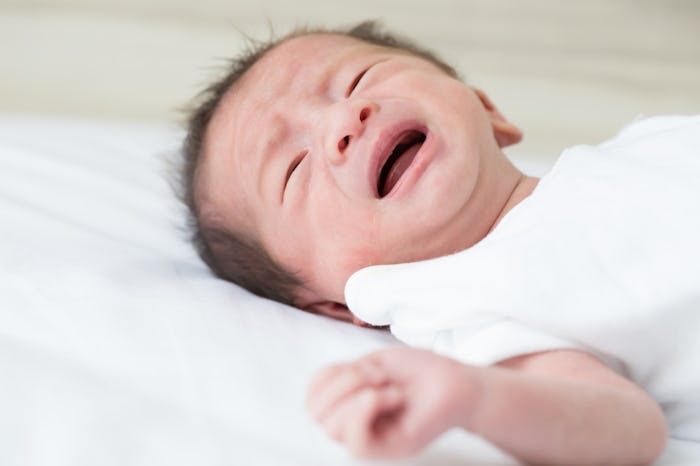Life

This Is What Dehydration Looks Like In A Baby, According To An Expert
If you've ever been sick with a gastrointestinal virus or food poisoning (or, let's be honest — a hangover), you know how awful it is to be dehydrated. Fortunately, you can take measures into your own hands and identify the problem. But, how can you tell if your baby is dehydrated? The signs are more subtle than you think, and it doesn't take long to happen.
According to the American Academy of Pediatrics (AAP), there are a few signs to look for when you're assessing your child's level of hydration. First, are they wetting at least six diapers per day? According to the website for Dr. Sears, the urine will be the color of apple juice. Fewer than six diapers per day in infants is a clear sign of dehydration. Is their mouth dry or moist? If they're not pooling saliva under their tongues, or their lips seem drier than normal, it is likely due to dehydration, the website also noted.
If the dehydration is secondary to diarrhea, your baby's stools will be loose. But if the dehydration is due to a problem feeding or vomiting, there won't be as many stools, and they'll be harder. According to the AAP, monitoring your child's stool activity is extremely important in assessing their level of dehydration. The APP also noted that infants experiencing dehydration will be less active and crabbier. Their fontanelle, or soft spot, will likely appear sunken, too.
These are all reasons to put in a call to your pediatrician for guidance and information. But according to emergency room nurse, Shayla Black, there are certain symptoms that mean a trip to the emergency room. These include your baby being limp or lethargic, dry sunken eyes, chapped lips with dry mouth, no wet diapers in over six hours, pale dry skin, rapid heart rate (it will feel like a butterfly), and if your baby is very fussy or very uncomfortable in addition to any symptoms.
However, Black tells Romper that if your baby is pooling saliva, their eyes are bright and shiny, and they're wetting a diaper every four or five hours, they're more than likely fine, but listen to your gut if you think something is wrong. "You have no idea how many times a mom comes into the ER with a very sick child saying, 'I knew something was wrong.' Your gut is more of a guide than you think," she says.
Black adds that mild dehydration can be eased by increasing the number of feedings in a newborn, just keep them very short if the baby has an upset tummy. Older babies can drink Pedialyte or clear, watered down juices, like white grape, to help them get back to normal. But above all, Black says, "Talk to your doctor. Dehydration is nothing to mess with in babies."